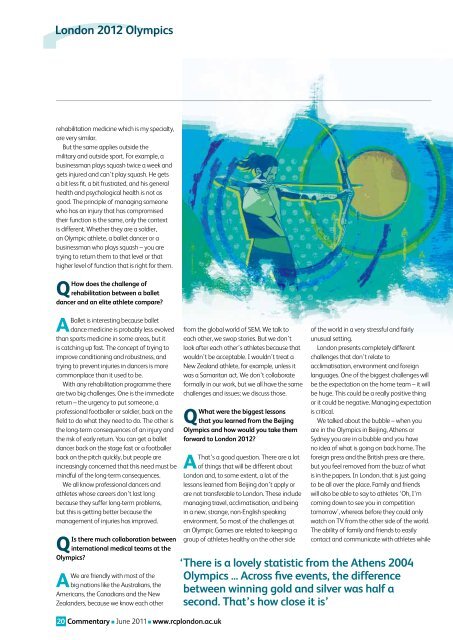Lindsey Davies: Q&A - Royal College of Physicians
Lindsey Davies: Q&A - Royal College of Physicians
Lindsey Davies: Q&A - Royal College of Physicians
You also want an ePaper? Increase the reach of your titles
YUMPU automatically turns print PDFs into web optimized ePapers that Google loves.
London 2012 Olympics<br />
rehabilitation medicine which is my specialty,<br />
are very similar.<br />
But the same applies outside the<br />
military and outside sport. For example, a<br />
businessman plays squash twice a week and<br />
gets injured and can’t play squash. He gets<br />
a bit less fit, a bit frustrated, and his general<br />
health and psychological health is not as<br />
good. The principle <strong>of</strong> managing someone<br />
who has an injury that has compromised<br />
their function is the same, only the context<br />
is different. Whether they are a soldier,<br />
an Olympic athlete, a ballet dancer or a<br />
businessman who plays squash – you are<br />
trying to return them to that level or that<br />
higher level <strong>of</strong> function that is right for them.<br />
How does the challenge <strong>of</strong><br />
Q rehabilitation between a ballet<br />
dancer and an elite athlete compare<br />
Ballet is interesting because ballet<br />
A dance medicine is probably less evolved<br />
than sports medicine in some areas, but it<br />
is catching up fast. The concept <strong>of</strong> trying to<br />
improve conditioning and robustness, and<br />
trying to prevent injuries in dancers is more<br />
commonplace than it used to be.<br />
With any rehabilitation programme there<br />
are two big challenges. One is the immediate<br />
return – the urgency to put someone, a<br />
pr<strong>of</strong>essional footballer or soldier, back on the<br />
field to do what they need to do. The other is<br />
the long-term consequences <strong>of</strong> an injury and<br />
the risk <strong>of</strong> early return. You can get a ballet<br />
dancer back on the stage fast or a footballer<br />
back on the pitch quickly, but people are<br />
increasingly concerned that this need must be<br />
mindful <strong>of</strong> the long-term consequences.<br />
We all know pr<strong>of</strong>essional dancers and<br />
athletes whose careers don’t last long<br />
because they suffer long-term problems,<br />
but this is getting better because the<br />
management <strong>of</strong> injuries has improved.<br />
Is there much collaboration between<br />
Q international medical teams at the<br />
Olympics<br />
We are friendly with most <strong>of</strong> the<br />
A big nations like the Australians, the<br />
Americans, the Canadians and the New<br />
Zealanders, because we know each other<br />
20 Commentary n June 2011 n www.rcplondon.ac.uk<br />
from the global world <strong>of</strong> SEM. We talk to<br />
each other, we swop stories. But we don’t<br />
look after each other’s athletes because that<br />
wouldn’t be acceptable. I wouldn’t treat a<br />
New Zealand athlete, for example, unless it<br />
was a Samaritan act. We don’t collaborate<br />
formally in our work, but we all have the same<br />
challenges and issues; we discuss those.<br />
What were the biggest lessons<br />
Q that you learned from the Beijing<br />
Olympics and how would you take them<br />
forward to London 2012<br />
That’s a good question. There are a lot<br />
A <strong>of</strong> things that will be different about<br />
London and, to some extent, a lot <strong>of</strong> the<br />
lessons learned from Beijing don’t apply or<br />
are not transferable to London. These include<br />
managing travel, acclimatisation, and being<br />
in a new, strange, non-English speaking<br />
environment. So most <strong>of</strong> the challenges at<br />
an Olympic Games are related to keeping a<br />
group <strong>of</strong> athletes healthy on the other side<br />
<strong>of</strong> the world in a very stressful and fairly<br />
unusual setting.<br />
London presents completely different<br />
challenges that don’t relate to<br />
acclimatisation, environment and foreign<br />
languages. One <strong>of</strong> the biggest challenges will<br />
be the expectation on the home team – it will<br />
be huge. This could be a really positive thing<br />
or it could be negative. Managing expectation<br />
is critical.<br />
We talked about the bubble – when you<br />
are in the Olympics in Beijing, Athens or<br />
Sydney you are in a bubble and you have<br />
no idea <strong>of</strong> what is going on back home. The<br />
foreign press and the British press are there,<br />
but you feel removed from the buzz <strong>of</strong> what<br />
is in the papers. In London, that is just going<br />
to be all over the place. Family and friends<br />
will also be able to say to athletes ‘Oh, I’m<br />
coming down to see you in competition<br />
tomorrow’, whereas before they could only<br />
watch on TV from the other side <strong>of</strong> the world.<br />
The ability <strong>of</strong> family and friends to easily<br />
contact and communicate with athletes while<br />
‘There is a lovely statistic from the Athens 2004<br />
Olympics ... Across five events, the difference<br />
between winning gold and silver was half a<br />
second. That’s how close it is’

















